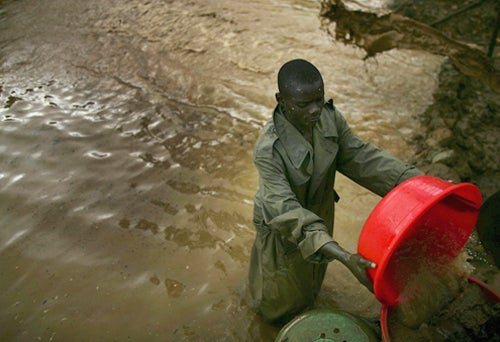
Are the metals in your laptop mined by children?
Waterloo professor supports global push to find out if metals in our electronics are fueling human rights abuses and war

Waterloo professor supports global push to find out if metals in our electronics are fueling human rights abuses and war
By Sam Toman Faculty of EnvironmentIt’s not hard to get fair trade coffee from Kenya or Indonesian wood certified by the Forest Stewardship Council.
But it’s harder to track where metals in our electronics come from.

Steven B. Young, associate professor at the School of Environment, Enterprise and Development, is playing a part in changing that by helping lead the Conflict Free Sourcing Initiative (CFSI) which supports companies from a range of industries in their efforts to address the use of conflict minerals in their supply chains.
Identifying conflict minerals is much more complex than many other resources. Ores are mined at hundreds of different mines and fed into a common smelter. The smelter may sell metal to hundreds of different buyers, then there might be five or 10 “layers of trading” before the metals end up in everything from electronics to cars and jewelry, says Young.
The problem is, in some parts of the world, such as the Democratic Republic of the Congo, mines have been seized by militias that use forced labour and children who work under deplorable conditions. The minerals are smuggled out and the proceeds used to buy weapons, says Young.
Not only is this obviously bad for the victims of conflict, it’s bad for the companies that use metals and end up fuelling, or being accused of fuelling, war and human rights abuses.
Many of the world’s largest companies have committed to making products free of conflict minerals, and they need initiatives like the CFSI to make that happen, says Young. The CFSI facilitates audits to determine which smelters and refiners can be validated as “conflict-free,” in line with current global standards.
Young, applies his industry knowledge, background in metallurgy and credibility as an academic as one of the experts overseeing the auditing process which 180 companies such Bell, Best Buy, Apple, Microsoft, and Sony rely upon for compliance with federal regulatory obligations.
Young describes the process as “an industry-led, voluntary effort toward corporate social responsibility” that’s “trying to certify the absence of conflict minerals and metals” in end-use products.

Read more
Waterloo co-op student applies engineering and tech skills at Caivan to support purpose-built housing and build land-development expertise

Read more
A Waterloo couple reflects on the campus that shaped their careers, their values, and their love story

Read more
Redefining capstone learning by bringing students, faculty and community partners together to tackle real-world challenges
The University of Waterloo acknowledges that much of our work takes place on the traditional territory of the Neutral, Anishinaabeg, and Haudenosaunee peoples. Our main campus is situated on the Haldimand Tract, the land granted to the Six Nations that includes six miles on each side of the Grand River. Our active work toward reconciliation takes place across our campuses through research, learning, teaching, and community building, and is co-ordinated within the Office of Indigenous Relations.